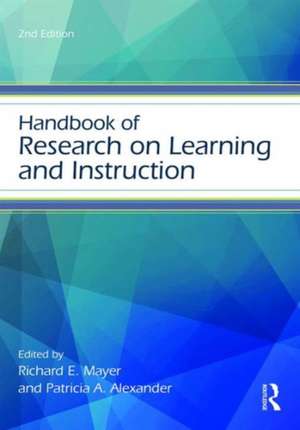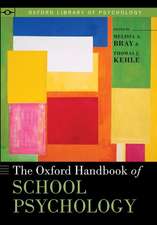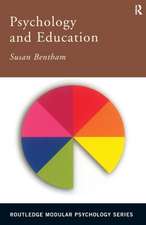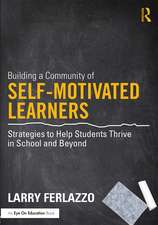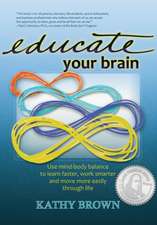Handbook of Epistemic Cognition: Educational Psychology Handbook
Editat de Jeffrey A. Greene, William A. Sandoval, Ivar Bråtenen Limba Engleză Paperback – 10 feb 2016
In six sections, scholars write within and across fields to focus and advance the role of epistemic cognition in education. With special attention to how researchers across disciplines can communicate and collaborate more effectively, this book will be an invaluable resource for anyone interested in the future of knowledge and knowing.
Dr. Jeffrey A. Greene is an associate professor of Learning Sciences and Psychological
Studies in the School of Education at the University of North Carolina at Chapel Hill.
Dr. William A. Sandoval is a professor in the division of Urban Schooling at
the UCLA Graduate School of Education & Information Studies.
Dr. Ivar Bråten is a professor of Educational Psychology at the Faculty of Educational
Sciences at the University of Oslo, Norway.
| Toate formatele și edițiile | Preț | Express |
|---|---|---|
| Paperback (1) | 855.57 lei 6-8 săpt. | |
| Taylor & Francis – 10 feb 2016 | 855.57 lei 6-8 săpt. | |
| Hardback (1) | 1948.91 lei 6-8 săpt. | |
| Taylor & Francis – 4 feb 2016 | 1948.91 lei 6-8 săpt. |
Din seria Educational Psychology Handbook
- 9%
 Preț: 804.31 lei
Preț: 804.31 lei - 9%
 Preț: 768.06 lei
Preț: 768.06 lei - 9%
 Preț: 804.75 lei
Preț: 804.75 lei - 5%
 Preț: 725.40 lei
Preț: 725.40 lei - 25%
 Preț: 666.31 lei
Preț: 666.31 lei - 18%
 Preț: 806.90 lei
Preț: 806.90 lei - 9%
 Preț: 1798.93 lei
Preț: 1798.93 lei - 18%
 Preț: 851.89 lei
Preț: 851.89 lei - 25%
 Preț: 689.67 lei
Preț: 689.67 lei - 18%
 Preț: 859.58 lei
Preț: 859.58 lei - 18%
 Preț: 849.52 lei
Preț: 849.52 lei - 18%
 Preț: 965.19 lei
Preț: 965.19 lei - 18%
 Preț: 856.62 lei
Preț: 856.62 lei - 18%
 Preț: 796.56 lei
Preț: 796.56 lei - 25%
 Preț: 607.05 lei
Preț: 607.05 lei - 18%
 Preț: 739.82 lei
Preț: 739.82 lei - 18%
 Preț: 811.49 lei
Preț: 811.49 lei - 18%
 Preț: 749.45 lei
Preț: 749.45 lei - 18%
 Preț: 791.60 lei
Preț: 791.60 lei - 18%
 Preț: 962.37 lei
Preț: 962.37 lei - 18%
 Preț: 747.57 lei
Preț: 747.57 lei
Preț: 855.57 lei
Preț vechi: 1043.39 lei
-18% Nou
Puncte Express: 1283
Preț estimativ în valută:
163.73€ • 171.15$ • 138.36£
163.73€ • 171.15$ • 138.36£
Carte tipărită la comandă
Livrare economică 07-21 martie
Preluare comenzi: 021 569.72.76
Specificații
ISBN-13: 9781138013421
ISBN-10: 1138013420
Pagini: 542
Ilustrații: 12
Dimensiuni: 178 x 254 x 28 mm
Greutate: 0.99 kg
Ediția:1
Editura: Taylor & Francis
Colecția Routledge
Seria Educational Psychology Handbook
Locul publicării:Oxford, United Kingdom
ISBN-10: 1138013420
Pagini: 542
Ilustrații: 12
Dimensiuni: 178 x 254 x 28 mm
Greutate: 0.99 kg
Ediția:1
Editura: Taylor & Francis
Colecția Routledge
Seria Educational Psychology Handbook
Locul publicării:Oxford, United Kingdom
Public țintă
PostgraduateCuprins
Chapter 1. Introduction (Jeffrey A. Greene, William A. Sandoval, Ivar Bråten). Section 1: Psychological Perspectives on Epistemic Cognition (Jeffrey A. Greene). Chapter 2. Epistemic Cognition as a Psychological Construct: Advancements and Challenges (Barbara K. Hofer). Chapter 3. Argumentative Reasoning (Kalypso Iordanou, Panayiota Kendeou, & Katinka Beker). Chapter 4. Logical and Causal Reasoning (David Moshman & Pina Tarricone). Chapter 5. Theory of Mind (Beate Sodian & Susanne Kristen). Chapter 6. Social Cognition (Fabrice Clément & Nathalie Terrier). Chapter 7. Responses to Handbook Section 1 (Patricia Alexander). Section 2: Disciplinary Perspectives on Epistemic Cognition (William A. Sandoval). Chapter 8. Epistemic Cognition in Science: Uncovering old roots to turn over new leaves (Andrew Elby, Chris Macrander, & David Hammer). Chapter 9. Epistemic Cognition in History (Bruce VanSledright & Lilana Maggioni). Chapter 10. Mathematical Epistemic Cognition (Fien Depaepe, Erik De Corte, & Lieven Verschaffel). Chapter 11. Epistemic Cognition in Literary Reasoning (Carol Lee, Susan Goldman, Sarah Levine, Joe Magliano, Mariya Yukhymenko-Lescroart, & Stephen Briner). Chapter 12. Responses to Handbook Section 2 (William A. Sandoval). Section 3: Epistemic Cognition Within and Beyond the Classroom (Ivar Bråten). Chapter 13. Exploring Epistemological Issues Related to Science Learning Across Contexts (Leah Bricker & Philip Bell). Chapter 14. Epistemic Cognition in Legal Reasoning (Michael Weinstock). Chapter 15. Epistemic Cognition and Reading for Understanding in the Internet Age (Helge I. Strømsø & Yvonne Kammerer). Chapter 16. The Role of Epistemic Cognition in Teacher Learning and Praxis (Michelle Buehl & Helenrose Fives). Chapter 17. Responses to Handbook Section 3 (Jeffrey A. Greene). Section 4: Epistemic Cognition Interventions (Ivar Bråten). Chapter 18: Teaching for Epistemic Change in Elementary School Classrooms (Lisa Bendixen). Chapter 19: Changes in Preservice Teachers’ Epistemic Beliefs (Jo Lunn Brownlee, Gregory Schraw, Sue Walker, & Mary Ryan). Chapter 20: Multiple Information Sources and Epistemic Change (Dorothe Kienhues, Leila E. Ferguson, & Elmar Stahl). Chapter 21: Epistemic Climate for Epistemic Change (Krista R. Muis, Gregory Trevors, & Marianne Chevrier). Chapter 22. Responses to Handbook Section 4 (Ivar Bråten). Section 5: Measuring and Modeling Epistemic Cognition (William A. Sandoval).Chapter 23. Psychological Perspectives on Measuring Epistemic Cognition (Lucia Mason). Chapter 24. Methodological Considerations for Interactional Perspectives on Epistemic Cognition (Gregory Kelly). Chapter 25. Epistemic (Meta)cognition: Thinking About Epistemic Practices (Sarit Barzilai & Anat Zohar). Chapter 26. Epistemic Cognition and Motivation (Jason A. Chen & Michael M. Barger). Chapter 27. Interrogating the Relation Between Conceptual Change and Epistemic Beliefs (P. Karen Murphy & Patricia Alexander). Chapter 28. Epistemic Cognition and Philosophy: Developing a New Framework for Epistemic Cognition (Clark A. Chinn & Ronald W. Rinehart). Chapter 29. Responses to Handbook Section 5 (Gale Sinatra). Section 6: Future Directions for Epistemic Cognition Research (Jeffrey A. Greene). Chapter 30. Reflections and Future Directions (Jeffrey A. Greene, William A. Sandoval, Ivar Bråten).
Recenzii
"The editors have done a masterful job bringing some cohesion to the disparate domains of epistemic beliefs, values, reasoning, practices, and cognition. The Handbook of Epistemic Cognition is an embracing conversation across contributions that is sure to stimulate richer scholarly engagements on how knowledge and knowing impact thinking and reasoning, and inform learning and teaching. The chapter and summary presentations reveal perplexing and persistent differences regarding methods and meanings and about what counts as evidence for things epistemic that will stimulate basic and applied research in the cognitive and learning sciences."
--Richard A Duschl, Waterbury Chair Professor, Pennsylvania State University, USA
"This book offers the most comprehensive coverage I have seen of this important topic. It will be a valuable handbook to those seeking to bring investigation of how we know and understand knowing to its rightful place at the center of cognition and cognitive development research."
--Deanna Kuhn, Professor of Psychology and Education, Teachers College, Columbia University, USA
"The Handbook of Epistemic Cognition presents a constructively critical tour of theory, empirical findings, and methods for researching how people view the ways they generate and validate knowledge. If you’re an educator, a research psychologist or someone who wants to understand why you believe what you do about history, science or health, this book will be an important resource."
--P.H. Winne, Professor and Canada Research Chair, Simon Fraser University, Canada
"‘Epistemic cognition’ is a concept and research agenda about the knowledge we need for living in a complex world. This volume offers several very helpful maps for travelling the territories of research on the topic, and it demonstrates the import of epistemic cognition for learning in formal and informal learning-contexts."
--Rainer Bromme, Professor of Educational Psychology, University of Münster, Germany
"Handbook of Epistemic Cognition provides an overview on how people build, understand, modify and use knowledge in formal and informal contexts.
It also draws attention to the significance of clarifying the meaning of epistemic change in relation to instructional frameworks. Across the book, there is representation of a diversity of disciplines, types of reasoning and contexts of cognition which makes the book a fairly robust source of reference for anybody who would be interested in not only being introduced to epistemic cognition, but also in unpacking the foundational research that have contributed to the conceptualisation of epistemic cognition in a broad sense."
--Sibel Erduran, Science & Education (2019) 28:819–821
--Richard A Duschl, Waterbury Chair Professor, Pennsylvania State University, USA
"This book offers the most comprehensive coverage I have seen of this important topic. It will be a valuable handbook to those seeking to bring investigation of how we know and understand knowing to its rightful place at the center of cognition and cognitive development research."
--Deanna Kuhn, Professor of Psychology and Education, Teachers College, Columbia University, USA
"The Handbook of Epistemic Cognition presents a constructively critical tour of theory, empirical findings, and methods for researching how people view the ways they generate and validate knowledge. If you’re an educator, a research psychologist or someone who wants to understand why you believe what you do about history, science or health, this book will be an important resource."
--P.H. Winne, Professor and Canada Research Chair, Simon Fraser University, Canada
"‘Epistemic cognition’ is a concept and research agenda about the knowledge we need for living in a complex world. This volume offers several very helpful maps for travelling the territories of research on the topic, and it demonstrates the import of epistemic cognition for learning in formal and informal learning-contexts."
--Rainer Bromme, Professor of Educational Psychology, University of Münster, Germany
"Handbook of Epistemic Cognition provides an overview on how people build, understand, modify and use knowledge in formal and informal contexts.
It also draws attention to the significance of clarifying the meaning of epistemic change in relation to instructional frameworks. Across the book, there is representation of a diversity of disciplines, types of reasoning and contexts of cognition which makes the book a fairly robust source of reference for anybody who would be interested in not only being introduced to epistemic cognition, but also in unpacking the foundational research that have contributed to the conceptualisation of epistemic cognition in a broad sense."
--Sibel Erduran, Science & Education (2019) 28:819–821
Descriere
Epistemic cognition is a topic originating across disciplines with immediate applications in Education research. The Handbook of Epistemic Cognition brings together leading work from across disciplines, providing a comprehensive overview of this increasingly important topic.
